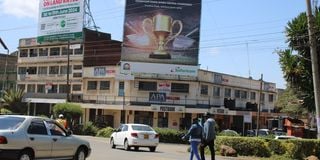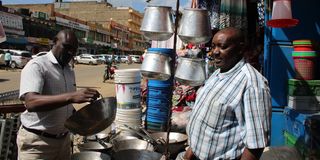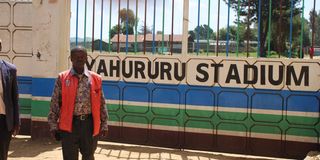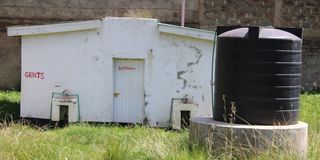Premium
Basket of goodies as Nyahururu prepares for upgrade to municipality

Nyahururu town in Laikipia County
Nyahururu Town, once associated with violence due to its origins and now enjoying relative peace, is gearing up for its comeback as a municipality.
The upgrade comes with a basket of goodies, including infrastructure development and service delivery. Targeted developments include the tarmacking of roads and the construction of stormwater drainage systems.
However, traders have mixed feelings about the governance of this transformation. Municipalities are mostly used to run towns and urban centres. The affairs of a municipality are managed by committees, and their responsibilities include collecting revenue, controlling land use, signing contracts, seeking partnerships and joint ventures, and regulating public transport.
At 95 years old, Nyahururu in Laikipia County is one of the oldest towns in Kenya. It was a favoured area for colonialists, including Lord Maurice Egerton, who owned large tracts of land around the town.
The colonialists appreciated the area's favourable climate for livestock and timber, as well as its proximity to the famous 243-foot tourist attraction, Thomson Falls, from which the town derived its name before it was changed to Nyahururu, a Maasai name meaning 'place of storms'.
The town has significant growth opportunities being a junction to other major towns including Nyeri, Nakuru, Rumuruti, Ol Kalou and Gilgil.
Nyahururu also has massive dairy farming activities and is home to one of the most active branches of Kenya Cooperatives Creameries (KCC), located near the sewer treatment plant opposite Manguo market centre.
Following the gazetting of Nyahururu as a municipality by Laikipia Governor Joshua Irungu, traders are optimistic that the stalled facelift initiated by former governor Ndiritu Muriithi under the Smart Town Initiative will resume.
The Smart Town model aims to improve the business environment, address waste management, ensure reliable water supply and sanitation, attract investors, promote innovation, industrialise, create jobs and provide long-term solutions to the projected urban population growth by 2050.
Announcing the gazettement of Nyahururu Municipality, Governor Irungu said the town will undergo a major facelift after the gazettement is issued on May 7, 2024.

Trader Mbugua Mbuthi attends to a customer in Nyahururu town.
During the struggle for multiparty politics, Nyahururu was a flashpoint. It was here that the art of attacking anti-riot police with bees was first experimented with, with the desired results, according to residents.
“Former President Daniel arap Moi was very keen on Nyahururu during the fight for multiparty politics. It was a political hotbed, and most of the declarations by the opposition were made here,” recounted Mr Mbugua Mbuthi, the chairperson of the Nyahururu Jua Kali Traders’ Association.
“The residents supported multiparty politics, which bothered the Moi regime due to the town's location and influence on neighbouring counties. Anti-riot police officers were ruthless during opposition political rallies.
“I remember a time they fired live bullets at those attending a rally at Nyahururu Stadium. That’s how residents came up with the idea of using bees. The bees were packed in containers designed to open when thrown towards police officers.
“That’s how we protected ourselves from police brutality. But that was then, Nyahururu is now a calm, peaceful, cosmopolitan town,” Mr Mbuthi added.
Joseph Kiguru, the former chairperson of the Laikipia Assembly Finance and Planning Committee and also former Igwamiti MCA, said Nyahururu Municipality was approved by the House in 2021 and a budget of Sh1.1 billion was needed to fully implement the municipality status.
“The idea behind the Smart Towns Initiative was to widen the finance base instead of increasing taxation on traders. Under Nyahururu Municipality, the municipality was to cover neighbouring towns, including Muthengera, which we had completed upgrading to a Smart Town,” he said.

The entrance to Nyahururu Stadium.
“We had started implementing Karuga Smart Town and then moved to Maina slums for a similar upgrade. An expanded town would attract more traders and investors, preventing the scramble for space within Nyahururu CBD. With such an expansion, investors would start supermarkets across the municipality and other investments.”
The extended township would mean that people from rural areas would not have to travel to Nyahururu town to buy or sell goods. It would also help the county access World Bank funding and create a conducive business environment.
Mr Kiguru cites Nyahururu town, where every trader wanted a front space, especially near Equity Bank and the main stage, while the back of the town was abandoned.
“With the Smart Town model, abandoned commercial buildings were occupied after they were upgraded. The model worked and we increased revenue collection from Sh480 million in 2017 to Sh880 million by 2022 without increasing levies on traders. The secret to increasing county revenue is widening the revenue base and creating a conducive business environment, not increasing charges for single business permits,” he explains.
“The next plan was to review taxes downward where traders felt oppressed after the full implementation of the widened revenue base. This was to be done through public participation. It was a win-win situation for traders and the government,” said the former MCA.
The target was to increase revenue collection to Sh1.4 billion upon completion of the Smart Towns implementation. Nyahururu and Nanyuki towns contribute about 75 per cent of the county government's total revenue.
Like Mr Mbuthi, other traders interviewed by the Nation are optimistic and enthusiastic about the municipality, but their main concern is inclusivity in the municipality board.
“We lacked many services after the abolishment of the municipality under the defunct local authority ministry, and the implementation of the Smart Towns also stalled. There is poor sewerage and garbage management... Those in residential areas have to unblock their sewer lines and collect garbage themselves. We are optimistic that the municipality will address these challenges, but this can only work if locals are appointed to serve on that board,” said Mr Mbuthi.
Mr Denis Ndereva, a youth leader, echoes these sentiments, saying he fears political manipulation of the municipality board.
“We have seen what has happened in other new municipalities, where the board and senior staff positions are awarded to politicians' relatives. Our demand is for an all-inclusive board, with 70 per cent of the members being natives who understand our challenges. Youth and women must get their slots, but be competitively selected,” said Mr Ndereva, who is the chairperson of Youth for Youth Africa.
For Francis Njega, chairperson of the Nyahururu Business Community, the appointment of the board must involve stakeholders from all sectors.
“To avoid conflicts, residents need to be educated about the municipality. This will help avoid conflicts when the government decides to increase taxation. We urge the Igwamiti MCA to ensure civic education is done and the process is transparent. We want to be aware of any rate increments,” said the trader.
Nyahururu town is in Igwamiti Ward, which was created at the start of devolution by merging Kiganda, Ndunyu and Hospital Wards.

Neglected toilets and changing rooms at Nyahururu Stadium.
William Ng'ang'a, a sports coach, says the Nyahururu stadium is abandoned and all development initiated by the previous regime has stalled.
“We want the board to have a sports representative. It’s a shame to have Nyahururu Stadium, which has produced so many athletes, neglected. This is where most international marathoners came to practice.
Nyahururu is known for sports, but we do not get the support and attention we deserve to promote local talents. I expect the municipality to address this issue,” said Mr Ng’ang’a.





